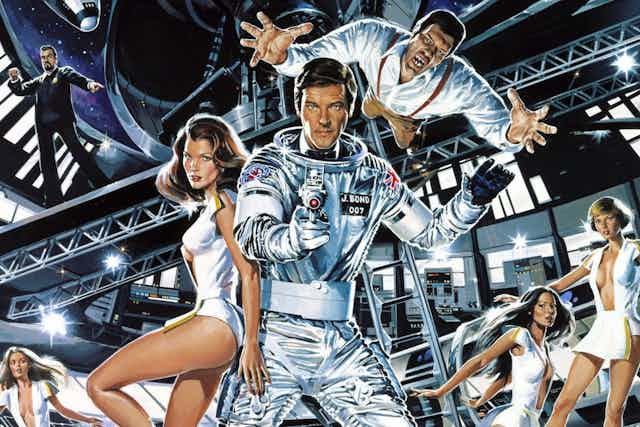Fears over North Korea’s nuclear weapons programme and mounting tensions with America are a chilling reminder of the Cold War and an era that many assumed was in the past.
Yet these disturbing echoes continue to resonate – perhaps because the themes are so embedded in popular culture and, in this case, popular fiction. Even that very British hero James Bond has something to say to diplomats dealing with the worsening situation with Pyongyang.
July 27 marked the anniversary of the signing of the armistice that ended the Korean war in 1953 – although the war between North and South has never officially ceased. Sixty-four years on the after effects continue with North Korea now possessing an intercontinental ballistic missile (ICBM). Desire for a missile that can deliver a nuclear warhead to far-away continents returns to the 1950s Cold War pursuit of a nuclear warhead that could travel faster than any bomber aircraft. America, Britain, China, France and the USSR all chased this goal, that combined space race and Nazi-era weapons technology.
The USSR won both, firing the world’s first ICBM in 1957 and getting the first human to space and back with Yuri Gagarin in 1961. Joseph M Siracusa argues in his book, that the nuclear missile seemed to offer immunity from nuclear attack as “no nuclear power may use military force against another nuclear power”. Other countries seeking the security of Mutually Assured Destruction (MAD) have followed, with the nuclear “club” since growing in size to an official, possibly inaccurate, number of nine members.
Bond and the bomb
That 1950s obsession with the long-range ballistic missile found its way into fiction. To be popular, spy fiction must reflect the fears of society and governments. During the Cold War, Ian Fleming’s James Bond was there to examine those fears. Two years before the first ICBM was fired by the USSR, Fleming made Britain’s desire for such a weapon the centre of his 1955 Bond novel, Moonraker.

Fleming – who was once described by Sean Connery as a “tremendous snob” – was also capable of bringing racism into his novels. In Goldfinger, published six years after the messy end of the Korean war, Fleming, perhaps still smarting from a conflict that Britain and American came out of quite badly, has the eponymous villain tell Bond: “Koreans are the cruellest, most ruthless people in the world”. So, of course, Goldfinger employs a Korean by the name of Oddjob as his chief henchman.
Fleming was born in London, went to Eton and tried to find work in the diplomatic service after learning French, German and Russian before finally landing a job at Reuters news agency. He worked there for three years and honed his trademark sparse writing style. At the onset of World War II, Fleming joined the navy and with his talent for languages went into Naval intelligence. Fleming credited that time with helping inform his Bond books.
Cold War echoes
The Cold War haunts Fleming’s novels. In 1955 Britain was less than a decade out of World War II and was now in the throes of a long and troubling stalemate with the USSR. The legacy of war was everywhere. Rationing had only just ended in 1954 and the meals, drink, drugs and lifestyle described in the Bond books were unimaginable to the majority of the public. This was a time of dreary poverty, National Service, the Cambridge spies and high-profile defections to the USSR, such as Kim Philby. The war in Korea had ended only two years before. In 1954 the French were defeated in their Indochinese colony (Vietnam) by Ho Chi Minh’s nationalist army, setting the scene for America’s entry into the Vietnam War which lasted until 1975.

Moonraker was Fleming’s third novel featuring secret agent, Commander James Bond. In this book Hugo Drax – on the surface a millionaire war hero – promised to make Britain great again by creating an ICBM before any other country has one. Drax plans to use the kind of Nazi rocket technology that had sent the V2 rocket to bomb Britain during the war and would be the next big advance in nuclear warhead delivery. Drax publishes an open letter to the Queen promising that Britain will become a first-rate power with an ICBM and becomes a national hero as Britain will be ahead of the Americans and the Russians.
But Bond’s boss, M, who like Drax is a member of the London club Blades, does not trust Drax because he thinks he cheats at cards. Bond humbles the villain at a card game and quietly exposes him as a cheat. The pair meet again when Bond goes to Drax’s plant where the IBCM is being made. Our hero eventually discovers that Drax and his men are indeed Nazis, backed by the USSR, who plan to fire the ICBM at London. His evil plans are, of course, foiled by Bond.
Not all fiction of the period ends with heroes saving the day. In Neville Shute’s atmospheric On the Beach, nuclear conflict occurs by accident and survivors go to Australia where the last humans will exist until the nuclear cloud reaches them. Siracusa asserts that the Cold War demonstrated “two ironclad, unwritten rules: first, no nuclear power may use military force against another nuclear power and, second, a nuclear power using military force against a non-nuclear nation, may not use nuclear weapons”. As more nations continue in the quest for nuclear bombs, we can only hope those rules still apply because Bond won’t be there to save the day.

